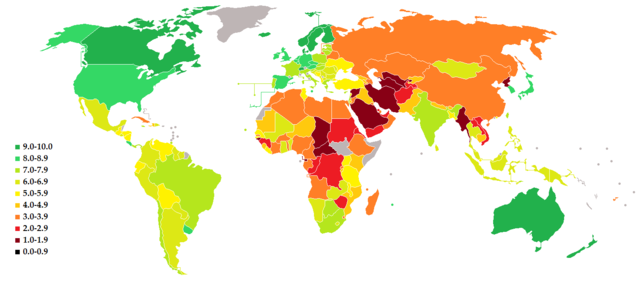 |
This is a file from the Wikimedia Commons. Information from its description page there is shown below.
Commons is a freely licensed media file repository. You can help.
|
| Description |
English: The Democracy Index is an index compiled by the Economist Intelligence Unit (a private business) that measures the state of democracy in 167 countries, of which 166 are sovereign states and 165 are UN member states. The Economist Intelligence Unit's Democracy Index is based on 60 indicators grouped in five different categories: electoral process and pluralism, civil liberties, functioning of government, political participation and political culture. The Index was first produced in 2006, with updated lists produced in 2008, 2010 and 2011.
According to the latest issue of the Index, for 2011 Norway scored a total of 9.80 on a scale from zero to ten, keeping its position from 2010, when it replaced Sweden as the highest ranked country in the index. North Korea scored the lowest with 1.08, remaining at the bottom in 167th place, the same as in 2010. The Democracy Index for 2011 highlights the impact of the Arab Spring and the greater effects it might have, as well as the impact of the global financial crisis in 2008–09 on politics throughout most of Europe. The Democracy Index score was lower in 2011 than in 2010 in 48 countries out of the 167 that are covered. It was higher in 41 ranked countries, and it stayed the same in 78.
|
| Date |
December 2011 |
| Source |
Democracy Index 2011 - democracy under stress, Economist Intelligence Unit. |
| Author |
Monocletophat123 |
 |
File:Democracy Index 2011 green and red.svg is a vector version of this file.
It should be used in place of this raster image when superior.
File:Democracy Index 2011.png  File:Democracy Index 2011 green and red.svg
For more information about vector graphics, read about Commons transition to SVG.
There is also information about MediaWiki's support of SVG images.
|
|
Licensing
I, the copyright holder of this work, hereby publish it under the following license:
  |
This file is made available under the Creative Commons CC0 1.0 Universal Public Domain Dedication. |
| The person who associated a work with this deed has dedicated the work to the public domain by waiving all of his or her rights to the work worldwide under copyright law, including all related and neighboring rights, to the extent allowed by law. You can copy, modify, distribute and perform the work, even for commercial purposes, all without asking permission. http://creativecommons.org/publicdomain/zero/1.0/deed.enCC0Creative Commons Zero, Public Domain Dedicationfalsefalse
|
|
File usage
The following pages on Schools Wikipedia link to this image (list may be incomplete):
This file contains additional information, probably added from the digital camera or scanner used to create or digitize it. If the file has been modified from its original state, some details may not fully reflect the modified file.
SOS Childrens Villages aims to make Wikipedia suitable for young learners. SOS Children's Villages believes education is an important part of a child's life. That's why we ensure they receive nursery care as well as high-quality primary and secondary education. When they leave school, we support the children in our care as they progress to vocational training or higher education. Help another child by taking out a sponsorship.




